Reflections on Addressing Educational Inequalities Through the Co-Creation of a Rubric for Assessing Children’s Plurilingual and Intercultural Competence
Abstract
1. Introduction
2. Theoretical Framework
2.1. Social Justice and Language Education Assessment
2.2. Assessment of Children’s Plurilingual and Intercultural Competence in Relation to SJ
- -
- Competence 8. Mediate between different languages in predictable situations, using strategies and knowledge to process and transmit basic and simple information, in order to facilitate communication.
- -
- Competence 9. Reflect in a guided manner on language and recognise and use personal linguistic repertoires through processes of comprehension and production of oral, written, and multimodal texts, using appropriate basic terminology, to begin developing linguistic awareness and improving skills in the application of these processes.
2.3. Culturally Responsive and Linguistically Sensitive Assessment Practices
- (1)
- What are the linguistic profiles of the primary education students participating in the study?
- (2)
- What mismatches and/or inequalities exist for plurilingual children in the participating Catalan state school (understood through the lens of SJ)?
- (3)
- How does the assessment rubric co-creation process and/or product attempt to mitigate these inequalities?
3. Methodology
3.1. Approach
3.2. Partners
3.3. Data Collection
3.4. Data Analysis
3.5. Ethical Considerations
4. Results and Discussion
4.1. Linguistic Profile of the Children
4.2. Reflective Questions: Identifying and Mitigating Mismatches
- (1)
- Children’s linguistic repertoires, knowledge, and skills
- (2)
- Assessment practices
- (3)
- Accessibility for learners
5. Conclusions
Author Contributions
Funding
Institutional Review Board Statement
Informed Consent Statement
Data Availability Statement
Conflicts of Interest
Appendix A. Reflection Questions, Grouped into Five Themes, Formed from Different Aspects of SJ Identified as Being Relevant in the Theoretical Framework
- 1.
- Children’s linguistic repertoires, skills and knowledge
- (1)
- Do assessments reflect and draw on cultural and linguistic strengths so that these strengths are made visible and assessed accordingly (based on Gay, 2018)?
- (2)
- Is academic achievement related to children’s cultural and language strengths (based on Gay, 2018)?
- (3)
- Are children able to use several languages (based on Melo-Pfeifer & Ollivier, 2023) simultaneously (e.g., mediation activities, CEFR)?
- (4)
- Do assessments allow for language mixing (based on Shohamy, 2011)?
- (5)
- Are language competence assessment and testing practices monolingual (based on Dendrinos, 2013; Shohamy 2009)
- (6)
- Does the assessment of multi-(lingual) competences include assessing meta- and cross-language functional competencies for learner/users’ self-efficacy and for their full participation in multilingual societies (based on Hofer & Jessner, 2019)?
- (7)
- Is ‘linguistic instrumentalism’ evident (based on Kubota, 2011)?
- (8)
- Which particular languages and varieties of languages are emphasised for individual successes? (based on Kubota, 2011)
- 2.
- Assessment practices
- (9)
- Is there transparency for learners so that they fully understand the purposes and uses of the assessment (based on Borghetti & Barrett, 2023)?
- (10)
- Is the purpose of the self-assessment tools communicated (accessibility issues based on Commission of Europe, 2018b)?
- (11)
- Do learners get involved in assessment practices, such as discussing scoring systems, reading rubrics in advance or even participating in the development of assessment tools (based on Borghetti & Barrett, 2023)?
- (12)
- Do language teachers know how to assess language skills or content knowledge using languages in combination, or different genres and distinct semiotic modes in combination with one another (based on Dendrinos, 2019)?
- (13)
- Are the teachers descriptor-mediators? (based on Commission of Europe, 2018b).
- 3.
- Accessibility for learners
- (14)
- Is the terminology accessible for learners? (based on Commission of Europe, 2018b)
- 4.
- The content of the descriptors
- (15)
- Do descriptors adequately reflect the behavioural options available to young learners (behavioural appropriateness) i.e., do they lie beyond their capacity (e.g., work) or linked to tasks that they would not normally perform in their (first) language (based on Commission of Europe, 2018b)?
- (16)
- Is the communicative behaviour simplified to be understood while maintaining its meaning? (based on Commission of Europe, 2018b).
- 5.
- Linguistic and cultural diversity and power relations
- (17)
- Is there a ‘one-size fits all’ approach (Karavas & Mitsikopoulou 2018) adopted by regional/national tests?
- (18)
- Is the plurilingualism that is validated through assessments reinforcing rather than challenging current relations of power (based on Kubota, 2011)?
| 1 | The term “plurilingualism” is used instead of “multilingualism” following the Council of Europe’s (2007) with the following distinction: “multilingualism” refers to the presence in a geographical area of more than one “variety of language” whereas “plurilingualism” refers to the repertoire language varieties which many individuals use. |
| 2 | This paper uses the term heritage language (HL) in place of “mother tongue” as a more inclusive term for languages associated with one’s cultural background and that may or may not be spoken in the home (Cho et al., 1997). |
| 3 | Language and culture can be considered mutually constitutive. The interplay between them includes cognitive representations of language (i.e., internal processes) and how people communicate with each other (i.e., external processes; Altarriba & Basnight-Brown, 2022). |
| 4 | Samples of materials are included as figures in this article. All materials (originals in Catalan and translations into English) can be found in the OSF repository (Segura & Knight, 2024). |
References
- Altarriba, J., & Basnight-Brown, D. (2022). The psychology of communication: The interplay between language and culture through time. Journal of Cross-Cultural Psychology, 53(7–8), 860–874. [Google Scholar] [CrossRef]
- Bagio Furtoso, V., Alves Egido, A., & Moraes, I. (2023). Chapter 9. Social justice in language assessment: Intercultural communicative competence in the celpe-bras exam. In E. Meletiadou (Ed.), Handbook of research on fostering social justice through intercultural and multilingual communication (pp. 162–186). IGI Global. [Google Scholar] [CrossRef]
- Bleichenbacher, L., Rossner, R., Schröder-Sura, A., & Pirih Svetina, N. (2023). Building blocks for planning language-sensitive teacher education, Council of Europe (European Centre for Modern Languages), Graz. Available online: www.ecml.at/languagesensitiveteachereducation (accessed on 12 June 2025).
- Borghetti, C., & Barrett, M. (2023). What do I need to know about quality and equity in the assessment of plurilingual, intercultural and democratic competences and the use of portfolios? In M. Byram, M. Fleming, & J. Sheils (Eds.), Quality and equity in education: A Practical guide to the council of Europe vision of education for plurilingual, intercultural and democratic citizenship. Multilingual Matters. [Google Scholar] [CrossRef]
- Canagarajah, S. (2006). Changing communicative needs, revised assessment objectives: Testing English as an international language. Language Assessment Quarterly, 3(3), 229–242. [Google Scholar] [CrossRef]
- Cho, G., Cho, K. S., & Tse, L. (1997). Why ethnic minorities want to develop their heritage language: The case of Korean-Americans. Language, Culture and Curriculum, 10(2), 106–112. [Google Scholar] [CrossRef]
- Cleave, E. (2020). Language, education and social justice: International strategies for systems change in multilingual schools. The Bell Foundation. Available online: https://www.bell-foundation.org.uk/app/uploads/2020/06/Churchill-Report-2020-FV-web.pdf (accessed on 12 June 2025).
- Commission of Europe. (2018a). Common European framework of reference for languages: Learning, teaching, assessment. Companion volume with new descriptors. Language Policy Unit. Available online: https://rm.coe.int/cefr-companion-volume-with-new-descriptors-2018/1680787989 (accessed on 3 November 2024).
- Commission of Europe. (2018b). ELP checklists for young learners. Some principles and proposals European language portfolio templates and resources. Language Biography. Available online: https://rm.coe.int/16804932bd (accessed on 3 November 2024).
- Council of Europe. (2007). From linguistic diversity to plurilingual education: Guide for the development of language education policies in Europe. Council of Europe. [Google Scholar]
- Council of Europe, Council for Cultural Co-operation, Education Committee & Modern Languages Division. (2001). Common European framework of reference for languages: Learning, teaching, assessment. Cambridge University Press. [Google Scholar]
- Dendrinos, B. (2013). Social meanings in global-glocal language proficiency exams. In C. Tsagari, S. Papadima-Sophocleous, & S. Ioannou-Georgiou (Eds.), Language testing and assessment around the globe: Achievements and experiences (pp. 46–60). Peter Lang. [Google Scholar]
- Dendrinos, B. (2015). The politics of instructional materials of English for young learners. In X. CurdtChristiansen, & C. Weninger (Eds.), Language, ideology and education: The politics of textbooks in language education. Routledge. [Google Scholar]
- Dendrinos, B. (2019). Multilingual testing and assessment for plurilingual education. MultiTest ECSPM position paper. Available online: https://ecspm.org/wp-content/uploads/2019/03/MultiTest.pdf (accessed on 4 November 2024).
- Erling, E. J., & Moore, E. (2021). INTRODUCTION–Socially just plurilingual education in Europe: Shifting subjectivities and practices through research and action. International Journal of Multilingualism, 18(4), 523–533. [Google Scholar] [CrossRef]
- European Commission/EACEA/Eurydice. (2019). Integrating students from migrant backgrounds into schools in Europe: National policies and measures. Eurydice report. Publications Office of the European Union. [Google Scholar]
- European Parliament. (2025). Factsheets on the European Union. Available online: https://www.europarl.europa.eu/factsheets/en/sheet/142/language-policy (accessed on 12 June 2025).
- Evan, C. (2021). A culturally responsive classroom assessment framework. The National Center for the Improvement of Educational Assessment. Available online: https://www.nciea.org/blog/a-culturally-responsive-classroom-assessment-framework/ (accessed on 12 December 2024).
- Fink, G. (2023). An introduction to cultural mismatch theory and its role in equitable learning. Every learner everywhere. Available online: https://www.everylearnereverywhere.org/blog/an-introduction-to-cultural-mismatch-theory-and-its-role-in-equitable-learning/ (accessed on 12 December 2024).
- Flores, N. (2013). The unexamined relationship between neoliberalism and plurilingualism: A cautionary tale. TESOL Quarterly, 47(3), 500–520. [Google Scholar] [CrossRef]
- Forbes, K., Evans, M., Fisher, L., Gayton, A., Liu, Y., & Rutgers, D. (2021). Developing a multilingual identity in the languages classroom: The influence of an identity-based pedagogical intervention. The Language Learning Journal, 49(4), 433–451. [Google Scholar] [CrossRef]
- Gardner, J., Holmes, B., & Leitch, R. (2009). Assessment and social justice. A futurelab literature review: Report 16. Futurelab Innovation in Education. Available online: https://www.nfer.ac.uk/media/k4glgn0h/futl63.pdf (accessed on 12 June 2025).
- Gay, G. (2018). Culturally responsive teaching: Theory, research, and practice. Multicultural Education Series. Multilingual Education. [Google Scholar]
- Generalitat de Catalunya. (2022). Competències específiques i criteris d’avaluació d’àrees i matèries. Llengua Estrangera. Available online: https://projectes.xtec.cat/nou-curriculum/wp-content/uploads/usu2072/2024/05/Llengua-Estrangera.pdf (accessed on 18 January 2025).
- Gerszon, D. M., Laknerr, C., Aguilar, A. C., & Wu, H. (2020). The impact of COVID-19 (Coronavirus) on global poverty: Why Sub-Saharan Africa might be the region hardest hit. World Bank Blogs. Available online: https://blogs.worldbank.org/en/opendata/impact-covid-19-coronavirus-global-poverty-why-sub-saharan-africa-might-be-region-hardest (accessed on 12 December 2024).
- Gorter, D., & Cenoz, J. (2017). Language education policy and multilingual assessment. Language and Education, 31(3), 231–248. [Google Scholar] [CrossRef]
- Heller, M., & Duchêne, A. (2016). Treating language as an economic resource: Discourse, data and debate. In N. Coupland (Ed.), Sociolinguistics: Theoretical debates (pp. 139–156). Cambridge University Press. [Google Scholar]
- Herdina, P., & Jessner, U. (2002). A dynamic model of multilingualism: Changing the psycholinguistic perspective. In Information structure in spoken arabic. Multilingual Matters. [Google Scholar]
- Hofer, B., & Jessner, U. (2019). Assessing components of multi-(lingual) competence in young learners. Lingua, 232(2), 102747. [Google Scholar] [CrossRef]
- Inbar, O. (2008). Constructing a language assessment knowledge base. Language Testing, 25(3), 385–402. [Google Scholar] [CrossRef]
- Infoscipedia. (2024). Intercultural communicative competence. Available online: https://www.igi-global.com/dictionary/intercultural-communicative-competence/55519 (accessed on 12 December 2024).
- Karavas, E., & Mitsikopoulou, B. (2018). Developments in glocal language testing: The case of the Greek national foreign language exam system. Peter Lang. [Google Scholar]
- Kubota, R. (2011). Questioning linguistic instrumentalism: English, neoliberalism, and language tests in Japan. Linguistics and Education, 22(3), 248–260. [Google Scholar] [CrossRef]
- Kubota, R. (2019). Confronting epistemological racism, decolonizing scholarly knowledge: Race and gender in applied linguistics. Applied Linguistics, 41(5), 712–732. [Google Scholar] [CrossRef]
- McArthur, J. (2015). Assessment for social justice: The role of assessment in achieving social justice. Assessment & Evaluation in Higher Education, 41(7), 967–981. [Google Scholar] [CrossRef]
- Melo-Pfeifer, S., & Ollivier, C. (Eds.). (2023). Assessment of plurilingual competence and plurilingual learners in educational settings: Educative issues and empirical approaches. Routledge. [Google Scholar]
- Moore, E., & Bernaus, M. (2021). Perspective 1: Plurilingual education in Europe: Contexts, initiatives and ongoing challenges. In E. Piccardo, A. Germain-Rutherford, & G. Lawrence (Eds.), The routledge handbook of plurilingual language education. Routledge. [Google Scholar] [CrossRef]
- Nieto, S., & Bode, P. (2012). Affirming diversity: The sociopolitical context of multilicultural education. Pearson Education. [Google Scholar]
- Ortega, L. (2019). SLA and the study of equitable multilingualism. Modern Language Journal, 103(S1), 23–38. [Google Scholar] [CrossRef]
- Ortega, L. (2020). The study of heritage language development from a bilingualism and social justice perspective. Language Learning, 70(S1), 15–53. [Google Scholar] [CrossRef]
- Osborn, T. (2006). Teaching world languages for social justice: A sourcebook of principles and practices. Routledge. [Google Scholar]
- Palmer, D. K., Cervantes-Soon, C., Dorner, L., & Heiman, D. (2019). Bilingualism, biliteracy, biculturalism, and critical consciousness for all: Proposing a fourth fundamental goal for two-way dual language education. Theory into Practice, 58(1), 121–133. [Google Scholar] [CrossRef]
- Pennycook, A., & Makoni, S. (2019). Innovations and challenges in applied linguistics from the global south. Routledge. [Google Scholar] [CrossRef]
- Phan, L. H., & Barnawi, O. Z. (2022). International TESOL teachers in a multi-englishes community. Mobility, on-the-ground realities and the limits of negotiability. Multilingual Matters. [Google Scholar]
- Piller, I. (2016). Linguistic diversity and social justice: An introduction to applied sociolinguistics. Oxford University Press. [Google Scholar]
- Randolph, L. J., Jr., & Johnson, S. M. (2017). Social justice in the language classroom: A call to action. Dimension, 99, 121. [Google Scholar]
- Roever, C., & McNamara, T. (2006). Language testing: The social dimension. International Journal of Applied Linguistics, 16(2), 242–258. [Google Scholar] [CrossRef]
- Ryan, W. (1971). Blaming the victim. Pantheon. [Google Scholar]
- Segura, M., & Knight, J. (2024). Creating a school-child-family evaluation rubric for evaluating children’s plurilingual and intercultural competence in a Catalan primary school. Open Science Framework. [Google Scholar] [CrossRef]
- Shohamy, E. (2001). Democratic assessment as an alternative. Language Testing, 18(4), 373–391. [Google Scholar] [CrossRef]
- Shohamy, E. (2009). Language tests for immigrants: Why language? Why tests? Why citizenship? In G. Hogan-Brun, C. Mar-Molinero, & P. Stevenson (Eds.), Discourses on language and discourses on language and integration. John Benjamins Publishing Company. [Google Scholar] [CrossRef]
- Shohamy, E. (2011). Assessing multilingual competencies: Adopting construct valid assessment policies. The Modern Language Journal, 95(3), 417–429. [Google Scholar] [CrossRef]
- Stembridge, A. (2019). Culturally responsive education in the classroom: An equity framework for pedagogy. Routledge. [Google Scholar]
- Stephens, N. M., Fryberg, S. A., Markus, H. R., Johnson, C., & Covarrubias, R. (2012a). Unseen disadvantage: How American universities’ focus on independence undermines the academic performance of first-generation college students. Journal of Personality and Social Psychology, 102, 1178–1197. [Google Scholar] [CrossRef] [PubMed]
- Stephens, N. M., Townsend, S. S. M., Markus, H. R., & Phillips, T. (2012b). A cultural mismatch: Independent cultural norms produce greater increases in cortisol and more negative emotions among first-generation college students. Journal of Experimental Social Psychology, 48, 1389–1393. [Google Scholar] [CrossRef]
- Tavares, V. (2023). Social justice, decoloniality, and southern epistemologies within language education. Theories, knowledges, and practices on TESOL from Brazil. Routledge. [Google Scholar] [CrossRef]
- Vasquez, M. J. (2012). Psychology and social justice: Why we do what we do. American Psychologist, 67, 337–346. [Google Scholar] [CrossRef] [PubMed]
- Vertovec, S. (2007). Super-diversity and its implications. Ethnic and Racial Studies, 30(6), 1024–1054. [Google Scholar] [CrossRef]
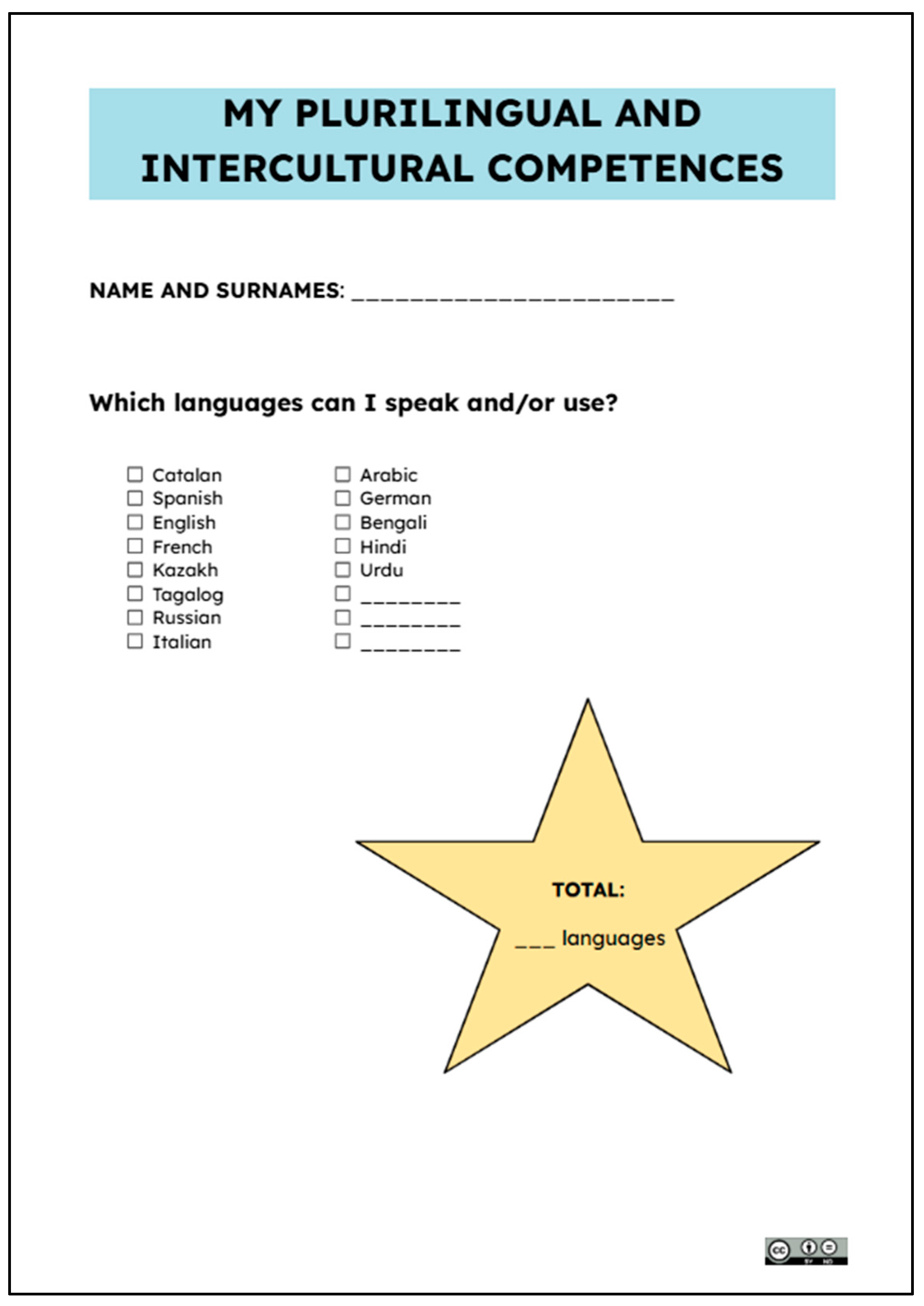
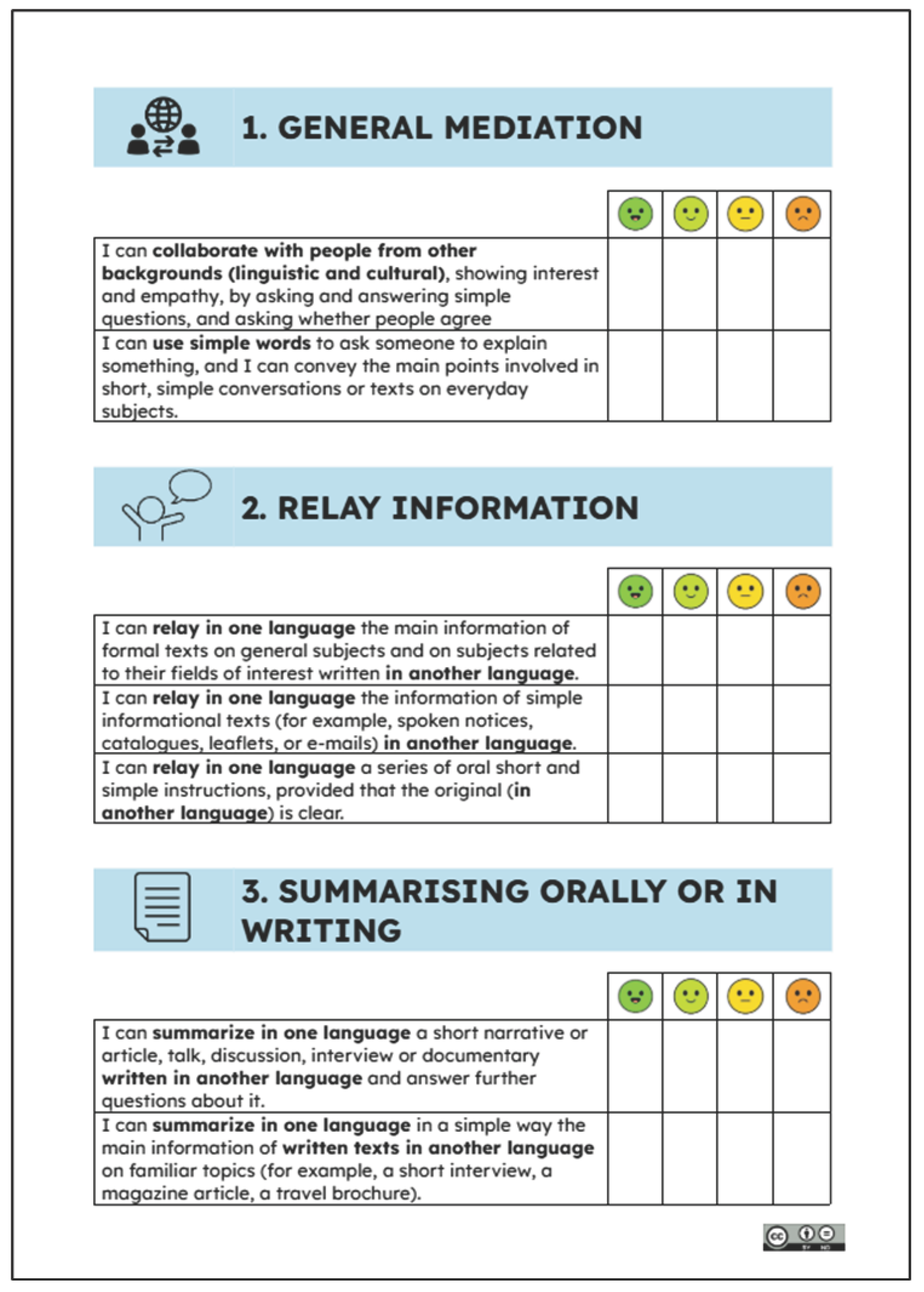
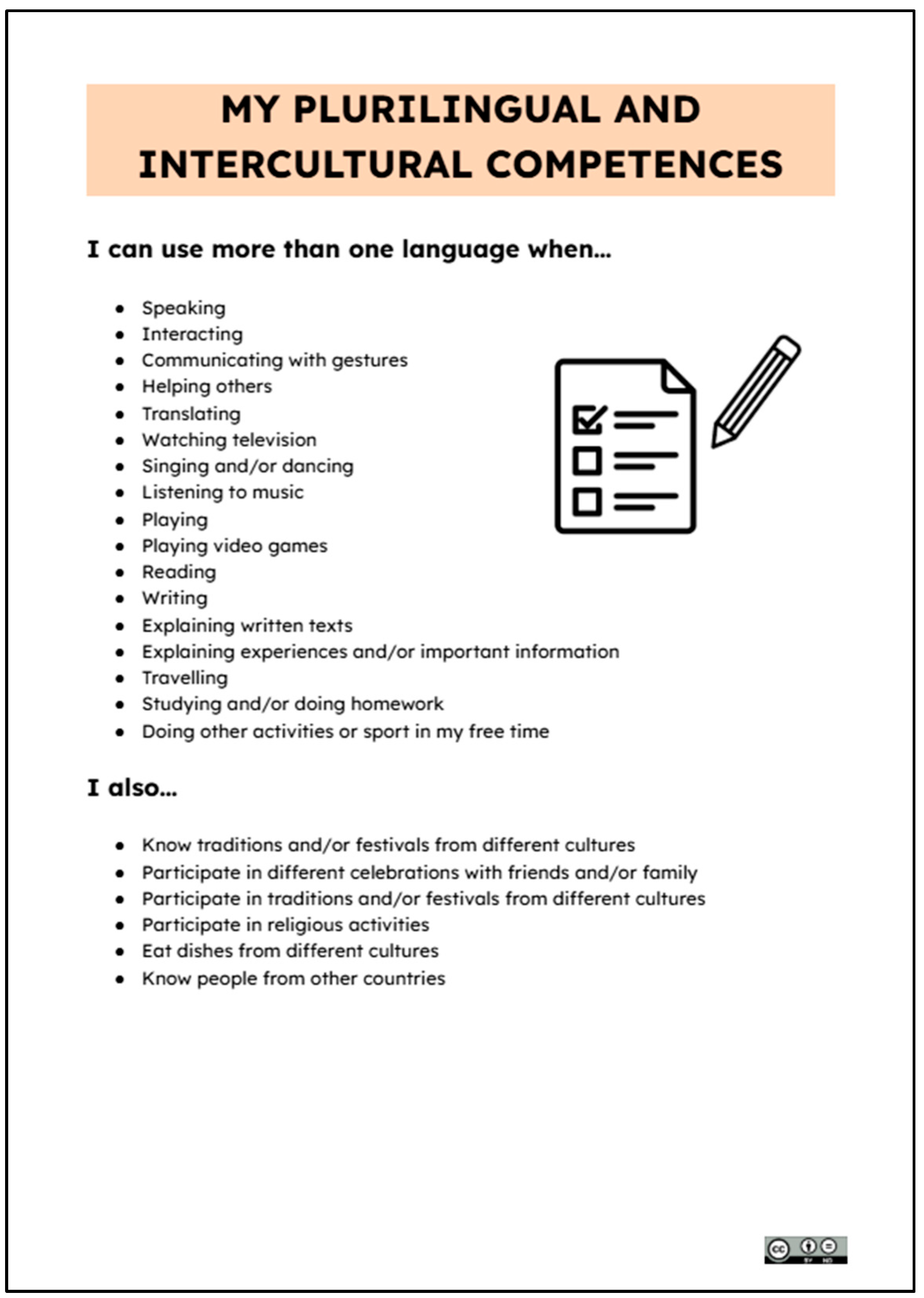
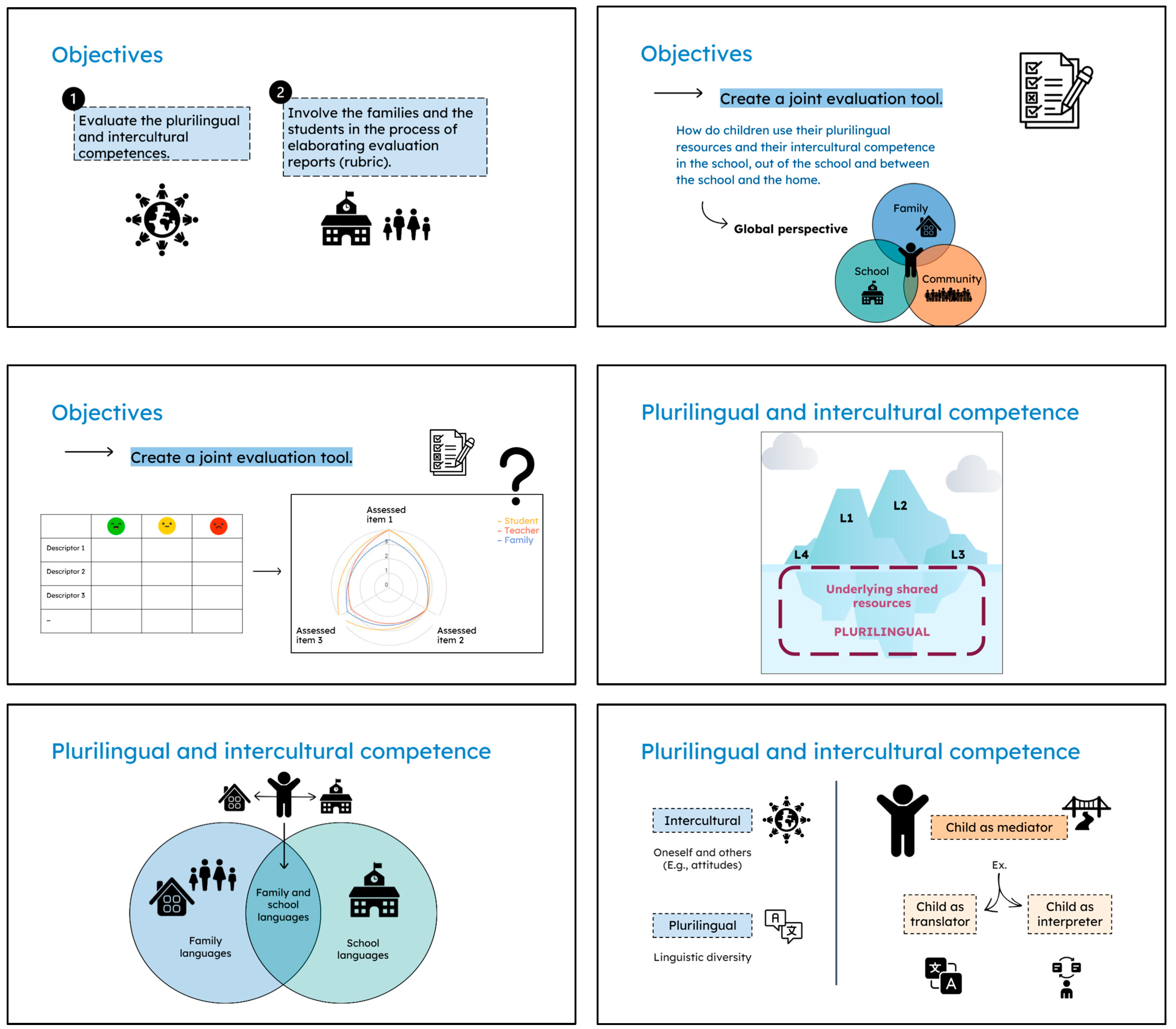
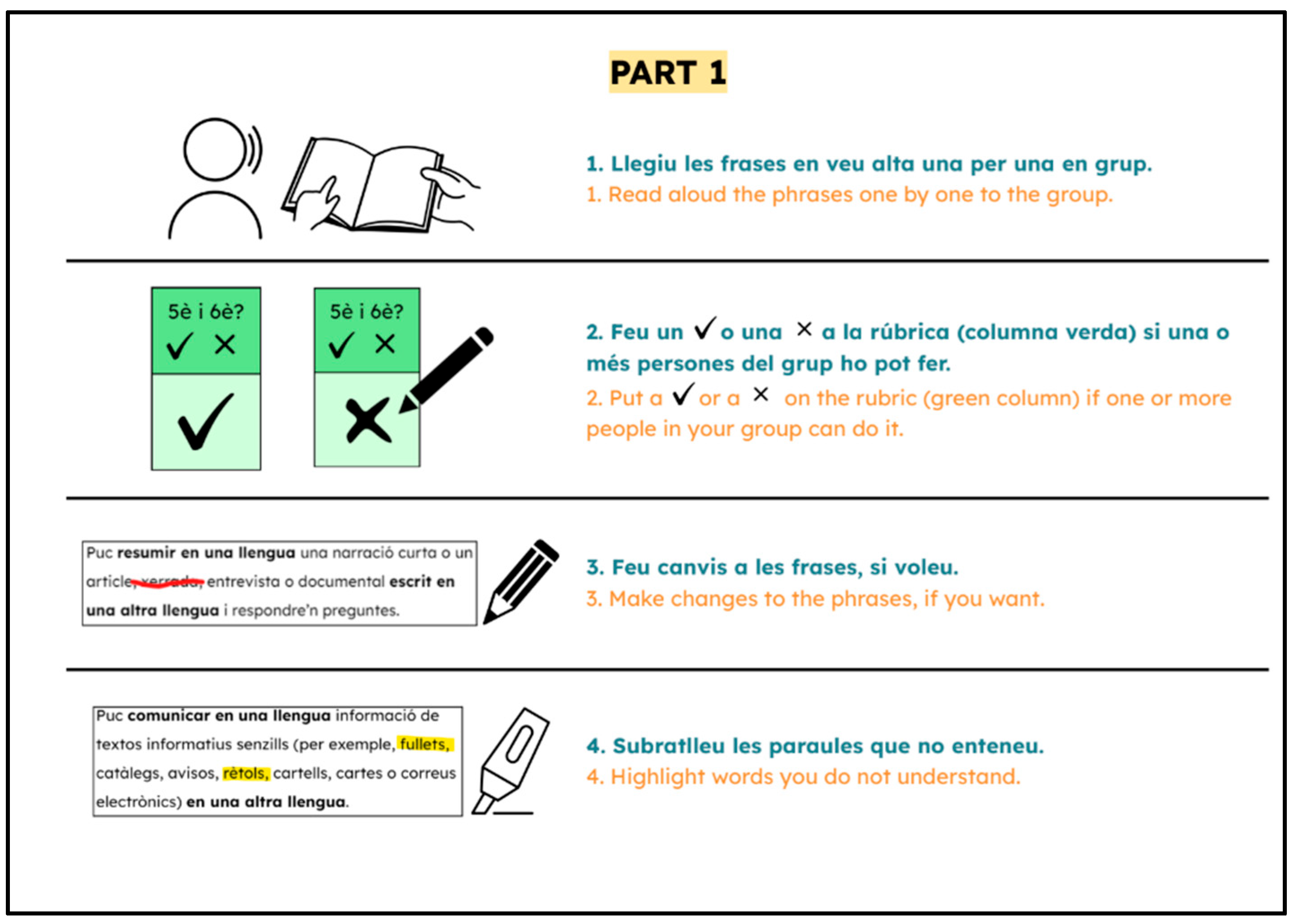
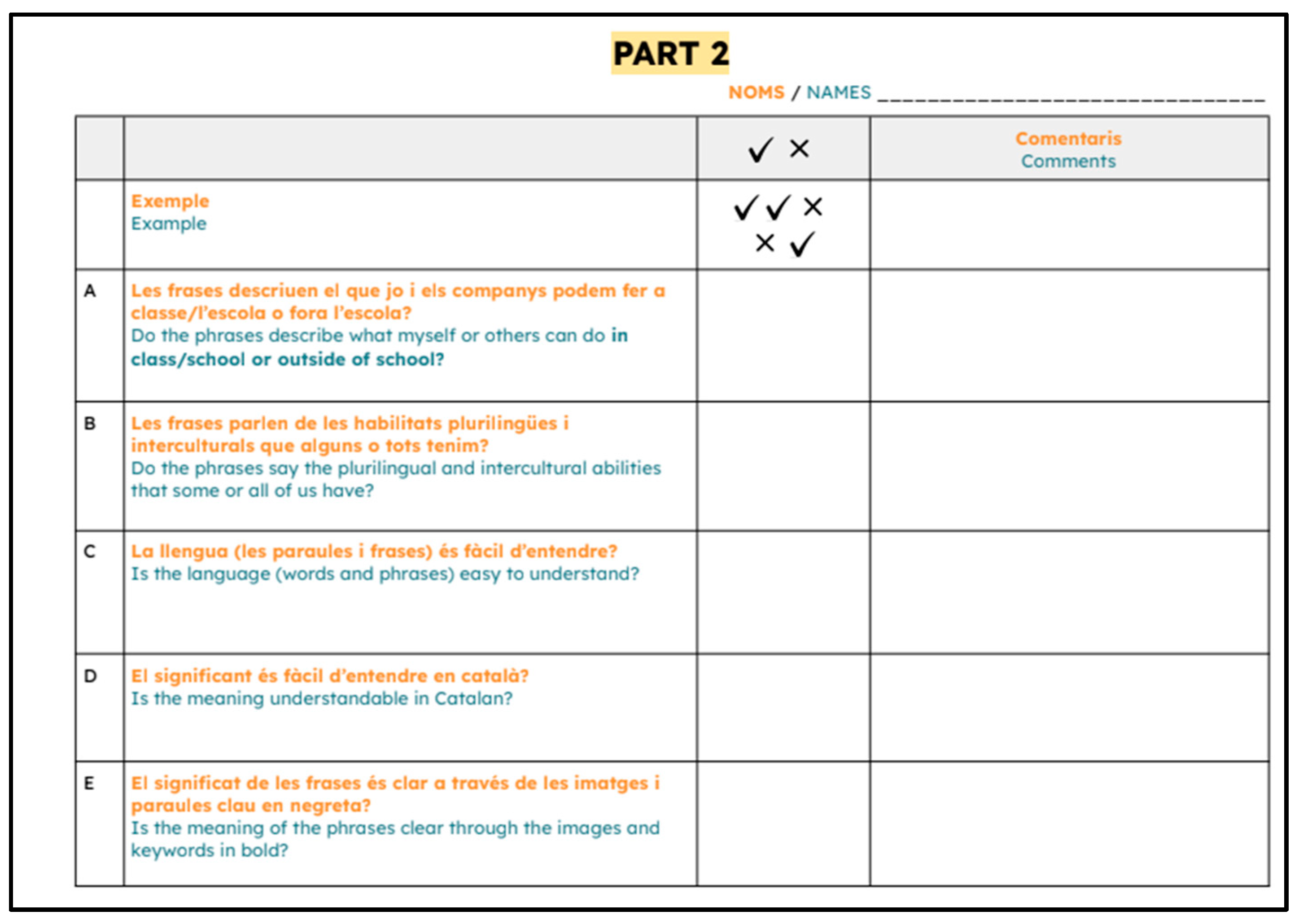
| No of Languages | 5th Year | 6th Year | No of Children That Reported Speaking N Languages |
|---|---|---|---|
| 1 language | 0 | 0 | 0 |
| 2 languages | 0 | 1 | 1 |
| 3 languages | 3 | 5 | 8 |
| 4 languages | 6 | 7 | 13 |
| 5 languages | 2 | 10 | 12 |
| 6 languages | 1 | 1 | 2 |
| 7 languages | 3 | 0 | 3 |
| 8 languages | 0 | 1 | 1 |
| Language | No of Children That Reported Speaking/Understanding the Language | ||
|---|---|---|---|
| 5th Year | 6th Year | Total | |
| Catalan | 15 | 25 | 40 |
| Spanish | 15 | 25 | 40 |
| English | 15 | 24 | 39 |
| French | 2 | 10 | 14 |
| Italian | 6 | 6 | 12 |
| Arabic | 1 | 6 | 7 |
| Hindi | 5 | 0 | 5 |
| Urdú | 4 | 1 | 5 |
| Chinese | 0 | 3 | 3 |
| Punjabi | 2 | 1 | 3 |
| Japanese | 0 | 2 | 2 |
| Russian | 1 | 1 | 2 |
| Tagalog | 1 | 1 | 2 |
| Bengali | 1 | 0 | 1 |
| Galician | 1 | 0 | 1 |
| German | 1 | 0 | 1 |
| Guarani | 0 | 1 | 1 |
| Ilocano | 0 | 1 | 1 |
| Korean | 0 | 1 | 1 |
| Polish | 0 | 1 | 1 |
| Portuguese | 0 | 1 | 1 |
Disclaimer/Publisher’s Note: The statements, opinions and data contained in all publications are solely those of the individual author(s) and contributor(s) and not of MDPI and/or the editor(s). MDPI and/or the editor(s) disclaim responsibility for any injury to people or property resulting from any ideas, methods, instructions or products referred to in the content. |
© 2025 by the authors. Licensee MDPI, Basel, Switzerland. This article is an open access article distributed under the terms and conditions of the Creative Commons Attribution (CC BY) license (https://creativecommons.org/licenses/by/4.0/).
Share and Cite
Knight, J.; Segura, M. Reflections on Addressing Educational Inequalities Through the Co-Creation of a Rubric for Assessing Children’s Plurilingual and Intercultural Competence. Educ. Sci. 2025, 15, 762. https://doi.org/10.3390/educsci15060762
Knight J, Segura M. Reflections on Addressing Educational Inequalities Through the Co-Creation of a Rubric for Assessing Children’s Plurilingual and Intercultural Competence. Education Sciences. 2025; 15(6):762. https://doi.org/10.3390/educsci15060762
Chicago/Turabian StyleKnight, Janine, and Marta Segura. 2025. "Reflections on Addressing Educational Inequalities Through the Co-Creation of a Rubric for Assessing Children’s Plurilingual and Intercultural Competence" Education Sciences 15, no. 6: 762. https://doi.org/10.3390/educsci15060762
APA StyleKnight, J., & Segura, M. (2025). Reflections on Addressing Educational Inequalities Through the Co-Creation of a Rubric for Assessing Children’s Plurilingual and Intercultural Competence. Education Sciences, 15(6), 762. https://doi.org/10.3390/educsci15060762






